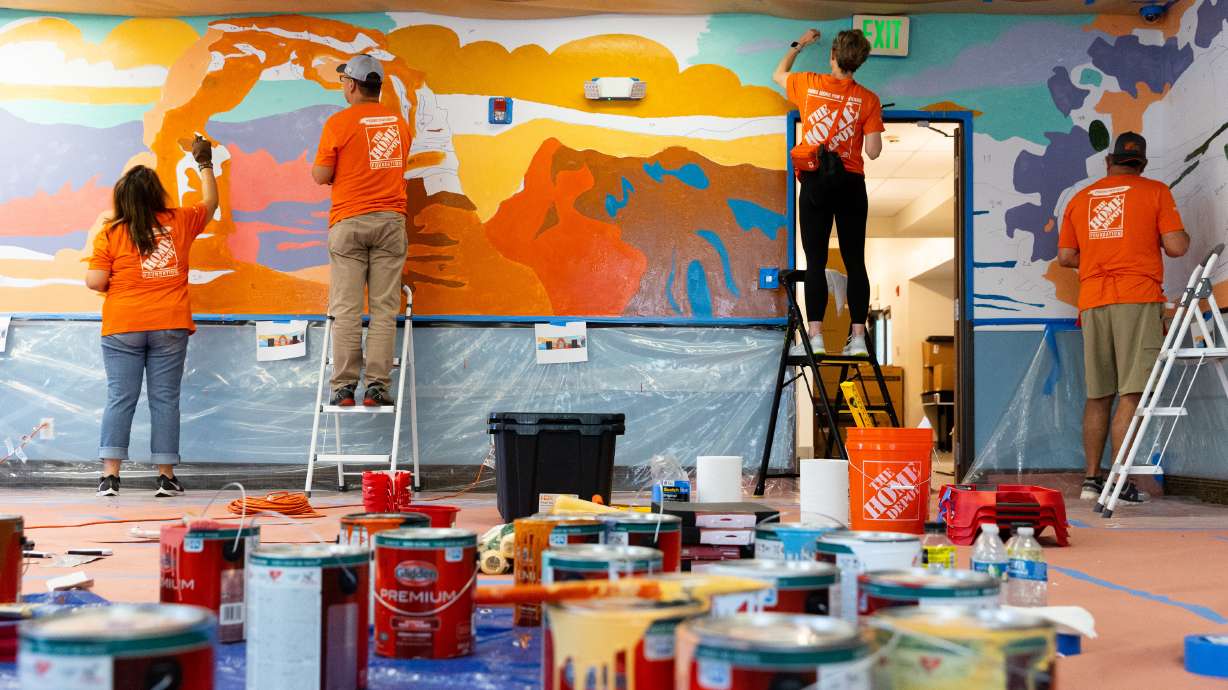Estimated read time: 3-4 minutes
This archived news story is available only for your personal, non-commercial use. Information in the story may be outdated or superseded by additional information. Reading or replaying the story in its archived form does not constitute a republication of the story.
SALT LAKE CITY — Two permanent housing facilities in Salt Lake City were renovated Wednesday to bring residents an improved sense of home and community.
The renovation of Freedom Landing, 1900 W. North Temple, and Sunrise Metro, 580 S. 500 West, is a partnership between the Home Depot Foundation and the Housing Authority of Salt Lake City. The permanent supportive housing facilities house more than 200 people, including 120 formerly homeless veterans, individuals with disabilities and the chronically homeless.
"They are definitely the more vulnerable. These individuals, people forget that they're somebody's brother, father, mother, sister, and they've just had fallen on hard times. Everyone deserves a safe place to live," said Britnee Dabb, Housing Authority of Salt Lake City's deputy director.
The half-day project garnered a full-scale effort with over 500 volunteers working on a series of projects both outside the facilities and within the facilities. Efforts by the group included interior painting and creating murals, updating seating areas and other common area enhancements, kitchen improvements including new appliances, updating outdoor recreational areas and building playhouses.
"We use our money to provide housing for individuals, so having the extra money to create a more community-type build where it feels like home for them is so important. A lot of them come with just a shirt off their back," Dabb said.
The Home Depot Foundation has invested more than $475 million in veteran causes and improved more than 55,000 veteran homes and facilities since 2011. Additionally, the nonprofit has pledged to invest half of a billion dollars in veteran causes by 2025.
The projects on Wednesday provided more than a physical place to sleep for veterans and represented a wider commitment to the community.
"It's one thing to give a veteran a space to sleep and a roof over their head, but it's another to give them a space to actually live and enjoy," said Chuck Segel, Home Depot Foundation field specialist. "We don't want our veterans to feel forgotten about and having these spaces updated shows that they're not forgotten."
Segel is a veteran himself, having served as a U.S. Marine with two tours in Iraq. His second tour was shortened after he was shot by a sniper, but ultimately he finished his four years of service, exiting in 2008. The transition home was complicated by the Great Recession, and he had difficulty finding a job.
Segel entered the restaurant industry and later began working at Home Depot where he discovered the company's philanthropic work. The work "got its claws sunk" into Segel, who found that it helped with his post-traumatic stress disorder.
"When society fails to take care of our veterans, it's up to us veterans to help each other — like in the service, you don't leave anyone behind, and that's kind of my mindset," Segel said. "My sense of pride in being the service member is restored when I'm back with veterans and we're collectively helping each other and lifting each other up to be successful. That's what we did while we were in the service; that's what we need to be doing when we're out."









